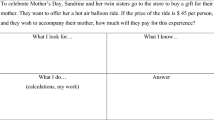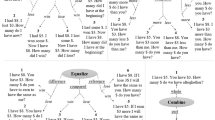Abstract
Mathematical word problems used in Verschaffel et al.’s (Learning and Instruction 7:339–359, 1994) study were applied in several follow-up studies. The goal of the present study was to replicate and extend the results of this line of research in a large sample of Hungarian students using an alternative set of data-gathering and data-analysis techniques. 4,037 students forming a nationwide representative sample of the Hungarian fifth-grade student population (aged 10–11) completed the test. The test contained five word problems from the list of 10 P(‘problematic)-items from Verschaffel et al.’s test. In contrast to all previous research in this domain, we used a multiple-choice format, where three options were given for each task: (a) routine-based, non-realistic answer, (b) numerical response that does take into account realistic considerations, (c) a realistic solution stating that the task cannot be solved. The hypotheses of this study were: (1) Students’ responses will confirm previous results, i.e. upper elementary school students prefer to respond to P-items by means of the routine-based answer; (2) Most students will demonstrate a more or less consistent preference for a given answer type (a, b or c) over problems; (3) Students’ school math marks will have low correlation indices with students’ achievement on these word problems. Our results confirm student’s overall tendency to follow non-realistic approaches when doing school word problem solving. The tendency even holds when confronting students with various kinds of realistic answers. Our results show that students demonstrate response patterns over problems, and that the correlation with math school performance is significant but small.

Similar content being viewed by others
References
Allain, P., Verny, C., Aubin, G., Pinon, K., Bonneau, D., Dubas, F., et al. (2005). Arithmetic word-problem-solving in Huntington’s disease. Brain and Cognition, 57, 1–3.
Baruk, S. (1985). L’âge du capitaine. De l’erreur en mathématiques. Paris: Seuil.
Berends, I. E., & van Lieshout, E. C. D. M. (2009). The effect of illustrations in arithmetic problem-solving: Effects of increased cognitive load. Learning and Instruction, 19, 345–353.
Bromme, R., Kienhues, D., & Porsch, T. (2010). Who knows what and who can we believe? Epistemological beliefs are beliefs about knowledge (mostly) to be attained from others. In L. D. Bendixen & F. C. Feucht (Eds.), Personal epistemology in the Classroom: theory, research, and implications for practice (pp. 163–194). Cambridge, UK: Cambridge University Press.
Cooper, C., & Dunne, M. (1998). Anyone for tennis? Social class differences in children’s responses to national curriculum mathematics testing. Sociological Review, 46, 115–148.
Cooper, C., & Harries, T. (2002). Children’s responses to contrasting ‘realistic’ mathematics problems: Just how realistic are children ready to be? Educational Studies in Mathematics, 49, 1–23.
Csíkos, C. (2003, August). How many buses are needed? Hungarian students’ achievement on ‘problematic’ word problems. Paper presented at the 10th European Conference for Research on Learning and Instruction, Padova, Italy.
Csíkos, C., Kelemen, R., & Verschaffel, L. (2009, August). Fifth-grade students’ approaches to and beliefs on mathematics word problem solving: A large sample Hungarian study. Paper presented at the 13th Biennial Conference for Research on Learning and Instruction held in Amsterdam, The Netherlands.
Csíkos, C., Szitányi, J., & Kelemen, R. (2010). Vizuális reprezentációk szerepe a matematikai problémamegoldásban. Egy 3. osztályos tanulók körében végzett fejlesztő kísérlet eredményei [in Hungarian—The role of visual representations in mathematical problem solving. Results of an experiment among 3rd grade students.]. Magyar Pedagógia, 110, 149–166.
Greer, B. (1987). Understanding of arithmetical operations as models of situations. In J. Sloboda & D. Rogers (Eds.), Cognitive processes in mathematics (pp. 60–80). Oxford, UK: Oxford University Press.
Greer, B. (1992). Multiplication and division as models of situations. In D. A. Grouws (Ed.), Handbook of research on mathematics education (pp. 276–295). New York: Macmillan.
Greer, B. (1993). The modeling perspective on wor(l)d problems. Journal of Mathematical Behavior, 12, 239–250.
Greer, B. (1997). Modelling reality in mathematics classrooms: The case of word problems. Learning and Instruction, 7, 293–307.
Kelemen R. (2004): Egyes háttérváltozók szerepe „szokatlan” matematikai szöveges feladatok megoldásában [in Hungarian—The role of different background variables in solving ‘unusual’ mathematical word problems.]. Iskolakultúra, 11, 28–38.
Koninklijke Nederlandse Akademie van Wetenschappe [Royal Dutch Academia of Sciences]. (2009). Rekenonderwijs op de Basisschool. Analyse en Sleutels tot Verbetering [Mathematics education in the elementary school. Analysis and keys to improvement.]. Amsterdam: Koninklijke Nederlandse Akademie van Wetenschappen.
Lampert, M. (1990). When the problem is not the question and the solution is not the answer: Mathematical knowing and teaching. American Educational Research Journal, 27, 29–63.
Mayer, R. E., & Hegarty, M. (1996). The process of understanding mathematical problems. In R. J. Sternberg & T. Ben-Zeev (Eds.), The nature of mathematical thinking (pp. 29–53). Mahwah, NJ: Erlbaum.
Op’t Eynde, P., & De Corte, E. (2003, April). Students’ mathematics-related belief systems: Design and analysis of a questionnaire. Paper presented to the symposium, the relationship between students’ epistemological beliefs, cognition and learning, at the annual meeting of the American Educational Research Association, Chicago.
Pehkonen, E., & Pietilä, A. (2003, March). On relationships between beliefs and knowledge in mathematics education. Paper presented at the third conference of the European Society for Research in Mathematics Education, Bellaria, Italy.
Pollak, H. O. (1969). How can we teach applications of mathematics? Educational Studies in Mathematics, 2, 393–404.
Reusser, K., & Stebler, R. (1997). Every word problem has a solution—the social rationality of mathematical modeling in schools. Learning and Instruction, 7, 309–327.
Schoenfeld, A. H. (1991). On mathematics as sense-making: An informal attack on the unfortunate divorce of formal and informal mathematics. In J. F. Voss, D. N. Perkins, & J. W. Segal (Eds.), Informal reasoning and education (pp. 311–343). Hillsdale, NJ: Erlbaum.
Schoenfeld, A. H. (1992). Learning to think mathematically: Problem solving, metacognition, and sense-making in mathematics. In D. Grouws (Ed.), Handbook for research on mathematics teaching and learning (pp. 334–370). New York: MacMillan.
van den Heuvel-Panhuzien, M. (2005). The role of contexts in assessment problems in mathematica. For the Learning of Mathematics, 25, 2–9.
Verschaffel, L., & De Corte, E. (1993). A decade of research on word-problem solving in Leuven: Theoretical, methodological and practical outcomes. Educational Psychology Review, 5, 239–256.
Verschaffel, L., & De Corte, E. (1997). Word problems: A vehicle for promoting authentic mathematical understanding and problem solving in the primary school? In T. Nunes & P. Bryant (Eds.), Learning and teaching mathematics: An international perspective (pp. 69–97). Hove, UK: Psychology Press.
Verschaffel, L., De Corte, E., & Lasure, S. (1994). Realistic considerations in mathematical modelling of school arithmetic word problems. Learning and Instruction, 7, 339–359.
Verschaffel, L., Greer, B., & De Corte, E. (2000). Making sense of word problems. Lisee, The Netherlands: Swets & Zeitlinger.
Verschaffel, L., Van Dooren, W., Greer, B., & Mukhopadhyay, S. (2010). Reconceptualising word problems as exercises in mathematical modeling. Journal für Mathematik-Didaktik, 31, 9–29.
White, M. J. & Bruning, R. (2005). Impicit writing beliefs and their relation to writing quality. Contemporary Educational Psychology, 30, 166–189.
Wyndhamn, J., & Säljö, R. (1997). Word problems and mathematical reasoning—a study of children’s mastery of reference and meaning in textual realities. Learning and Instruction, 7, 361–382.
Yackel, E., & Cobb, P. (1996). Sociomathematical norms, argumentation, and autonomy in mathematics. Journal for Research in Mathematics Education, 27, 458–477.
Acknowledgments
The research presented in this paper was supported by the Hungarian National Science Fund (OTKA) projects 63360 and 81538 to the first author. Data collection took place in the framework of the Hungarian Educational Longitudinal Program (HELP) of the Research Group on the Development of Competencies, Hungarian Academy of Sciences (MTA-SZTE Képességkutató Csoport). This research was also partially supported by Grant GOA 2006/01 “Developing adaptive expertise in mathematics education” from the Research Fund K.U. Leuven, Belgium.
Author information
Authors and Affiliations
Corresponding author
Additional information
Parts of the present study have been presented at the 13th Biennial Conference for Research on Learning and Instruction held in Amsterdam, The Netherlands (Csíkos, Kelemen & Verschaffel, 2009).
Appendix
Appendix

Rights and permissions
About this article
Cite this article
Csíkos, C., Kelemen, R. & Verschaffel, L. Fifth-grade students’ approaches to and beliefs of mathematics word problem solving: a large sample Hungarian study. ZDM Mathematics Education 43, 561–571 (2011). https://doi.org/10.1007/s11858-011-0308-7
Accepted:
Published:
Issue Date:
DOI: https://doi.org/10.1007/s11858-011-0308-7




